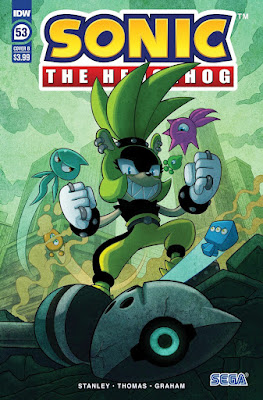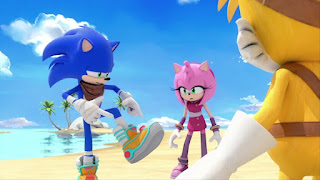Sonic the Hedgehog (IDW): Issue 53
Publication Date: September 28, 2022
Has anything fucked up suspense in the comic book industry more than solicitations for upcoming releases? Everyone can see the new covers and previews for titles months before they come out, meaning we all have a pretty good idea of where the stories are going before we even crack the books open. I mean, unless you are some sort of comic-reading luddite who doesn't look at the internet ever. But if you're reading comics, you're a nerd. So I feel like it's safe to assume you're probably online.
Anyway, all of this is a roundabout way of saying we knew issue 53 of IDW "Sonic" was going to feature a fight between Surge and Whisper, thanks to the main cover. We also knew Surge was going to win that fight, thanks to the variety cover where the villain is posing dramatically over Whisper's broken mask. I guess it's up to the writers and artists to make sure the issue is still worth reading even with this knowledge in our heads. (Or maybe the industry should just go back to wildly misleading covers. Preferably ones filled with apes.)
The previous issue made it look like a big confrontation between Surge and Eggman was coming. Instead, the Tenrec uses the Dynamo Cage to drain energy from some Egg-Pawns and then GTFOs from Eggperial City. Her logic is that Sonic is her target, not Eggman. She heads to Central City and starts terrorizing it, which draws the attention of Whisper. The fight turns when Surge realizes she can use the Dynamo Cage to absorb wisp powers. Before Sonic heads over to confront the villain, he has to break the bad news to Kit that his evil dad and evil sister/GF are presumed dead. The hydrokinetic kitsune doesn't take it well.
At first, I was worried about this issue. I've made it known in the past that my least favorite issues of "Sonic," regardless of which series I'm reading, are those that focus on characters trying to one-up each other with different superpowers. It reminds me too much of elementary school playground sessions, where friends would invent new powers to constantly turn the narrative in their favor. That shit is tedious. Surge really didn't need a power-up that allows her to steal energy and abilities from other characters to be a threat. We didn't need several panels to establish what Whisper's wisp can do, as we already know. Any time spent on such developments is just an excuse to escalate the action scenes in a way that feels artificial, instead of born out of the characters' conflicts.
Action heavy issues also tend to be Evan Stanley's weakest. She's better at the emotional stuff. Luckily, this issue starts to turn in that direction quickly enough. When Surge absorbs the wisps' powers, she seemingly sucks up the weird little alien things into her person. (Which I guess tracks with how the wisps' weird physiology has always worked.) That means Surge isn't just taking Whisper's defensive abilities from her: She's taking her friends. And we all know that Whisper has a bit of a complex about losing the people and weird Pokémon-looking things she loves. You really fucking feel her anguish, as Surge sucks up more of her little buddies. The panel devoted to Whisper clenching her teeth and hissing out "I need them BACK." hits me right in the soft spot, man.
Though this issue does change one aspect of Whisper's relationship with her glowy, multicolored sidekicks in a way that mildly bugs me. There's a panel that takes us behind Whisper's mask. That's when we learn she can understand what the little critters are saying to her. I think that's always been implied and, if not, I always assumed as much anyway. Yet the decision to show the wisp actually talking – including a gag of the orange one speaking in a verbose, precise manner – feels innately wrong to me. That would be like R2-D2 talking in perfect English. It adds more color to the word if they just remain jabbering little weirdos. Ya know, your dog doesn't speak but you can still communicate with it clearly. I kind of always assumed Whisper had a similar relationship with her buddies.
Nerdy nitpicking aside, the Whisper part of this issue works really well. That's the most effective emotional gut punch this issues serves up but it's not the only one. Though now aligned with Sonic, Kit is shown falling back into the role of hyper-subservient sidekick. He has just switched his total devotion from Surge to Sonic. This shows that Kit is a long way from breaking the psychological conditioning Starline cooked into him. When Sonic tells the blue fennec that the two people he's always looked up to are probably gone, it shakes Kit to the core. He falls into a total, catatonic depression. Following Starline and Surge is literally the only thing Kit knows how to do. Without that, his entire personality is forfeit. This is why the issue ends with him dramatically heading off to help Sonic. If Kit isn't following a leader with a single-minded, sometimes disturbingly aggressive determination, he might as well not exists.
That's good shit, man. The imposters have been, from the beginning, set up to be tragic villains, molded by circumstances outside of their control to do evil. Kit really seems to be the sadder of the two, as his pathetic desire to please others makes him seem even more like a lost little kid. Yet Surge's role is not done being defined either. After blasting out of Eggman's lab, with the Dynamo Cage charged up 100%, the tenrec sees Starline talking to her. At first, I took this as the book weaseling out of that villain's death already. Instead, it's quickly clarified to be a hallucination. Now, that's interesting. As much as Surge wants to let go of the destiny Starline designed for her, she can't. She still is driven to destroy Sonic. As much as she wants to turn her back on her creator, he's almost literally still inside her head. Not even death can remove the hold he has on her.
That the Starline hallucination speaks directly to Surge's insecurity shows this even more as a nagging weakness she just can't rid herself of. People who have been abused often internalize that mistreatment as a self-loathing feeling, an inner voice that constantly tears down their achievements. "Negative self-talk" is what they call it now. But that self-talk might as well be in the voice of the people who taught you that maladaptive behavior. Stanley has found an interesting way to visualize that psychology process in what is now officially the comic's most complex villain. (And it's also a way to keep fan-favorite Starline around without immediately undoing his death, so that's clever too.)
Hopefully, this review has made it clear that this issue does a competent job of balancing action and character development. Adam Thomas Bryce does the pencils. We all know he's extremely good at creating stylized action scenes, alongside emotional faces. Whisper getting beaten by Surge is so meaningful because Bryce makes the wolf's pained cries so vivid. This is also clear in the panels devoted to Kit's ego death, which really make an impression.
Yet sometimes Bryce gets carried away. The action panels are so elaborate here that they become hard to follow. I'm still not clear if the Dynamo Cage allows Surge to turn into pure lightning or if she's just moving so fast that it looks that way. Once the wisp superpowers get involved, the fight becomes even harder to track. There's a moment where Whisper grabs up a shattered piece of her mask to stab at Surge – great visual way to convey her growing desperation, by the way – that is far more compelling than any of the panels of characters zapping colorful bolts of whateverium at each other.
I also feel compelled to point out – and the fact that I've barely mentioned him in this review might already make this obvious – that Sonic is barely in this issue. It really does seem like the IDW comic is at its best when it relegates the blue hedgehog to a supporting role. I guess that's the best way to write around a corporation preventing you from giving the main character an inner life of any sort. You delegate all the heavy lifting in the series to supporting characters, with the title hero being an action guy that merely moves the plot forward. Honestly, I'm not complaining. If it works, it works. And Sonic has never been my favorite "Sonic" character.
While it gets off to a lumpy start, issue 53 finds its groove quickly enough. Surge and Kit have grown into compelling characters. Their psychological problems are involving. And brutalizing poor Whisper is always a good way to tug my heartstrings. I'm genuinely excited to see what'll happen next, once Kit discovers Surge is still alive. Damn, I hate it when this book is actually good and hooks me for another month. I guess I'm not canceling that Comixology subscription after all! [8/10]
















































